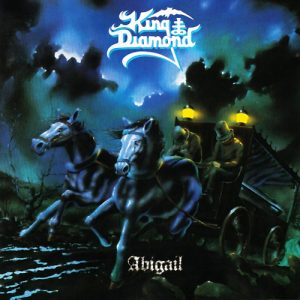 In these tumultuous times, the rights of the fetus, the infant, and the toddler have, somehow, survived. The right to transition from embryo to child in nine days, rather than nine months; the right to lash out and gain complete control of one’s own mother; the right to throw your unsuspecting father down slippery stairs; the right to explore one’s festering sarcophagus and eat until satisfied: these are the rights of our children—born and yet to be born. Privileges first chiseled on stone in 1987, privileges laid down by their founder and greatest defender: King Diamond. Without the unfaltering dedication by this respectable institution, this world would be in shambles. And, I for one, owe the man behind the scenes a debt of gratitude. Without our King, these sacred rights would fall to the wayside. The desire of our children to be more than helpless, swaddled bundles of cuteness would vanish from civilization. King is, by far, the greatest individual to grace this… [Grier finds himself interrupted by a sound coming from the far side of the house. Home alone with his daughter Abbie, he ventures into the kitchen to see what she has found in the pantry. “Abbie, you better not be getting into the cand… what are you eating?? Oh, Jesus Christ, stop!!”].
In these tumultuous times, the rights of the fetus, the infant, and the toddler have, somehow, survived. The right to transition from embryo to child in nine days, rather than nine months; the right to lash out and gain complete control of one’s own mother; the right to throw your unsuspecting father down slippery stairs; the right to explore one’s festering sarcophagus and eat until satisfied: these are the rights of our children—born and yet to be born. Privileges first chiseled on stone in 1987, privileges laid down by their founder and greatest defender: King Diamond. Without the unfaltering dedication by this respectable institution, this world would be in shambles. And, I for one, owe the man behind the scenes a debt of gratitude. Without our King, these sacred rights would fall to the wayside. The desire of our children to be more than helpless, swaddled bundles of cuteness would vanish from civilization. King is, by far, the greatest individual to grace this… [Grier finds himself interrupted by a sound coming from the far side of the house. Home alone with his daughter Abbie, he ventures into the kitchen to see what she has found in the pantry. “Abbie, you better not be getting into the cand… what are you eating?? Oh, Jesus Christ, stop!!”].
Can you believe it’s been thirty years since Abigail first graced us with her presence (and fifteen years since she returned to us once more)? In those thirty years, there are been a lot of mighty releases from this horror-loving outfit. But, arguably (by millions of motherfuckers, like myself), Abigail is the best. Before Missy, before Lucy, before Angel, before Victoria, there was Abigail. That white coffin, with the black “ABIGAIL” etched on its side, is about as iconic to the King Diamond character as face paint and cross-bones mic stand. Like Grandma, Abigail is a character that ties the entire King Diamond mythos together.
But Abigail’s not the only one needed for the story. Miriam, Jonathan, O’Brian, hell… even the goddamn mansion: not a one could be dismissed from the tale. Just the same, Abigail is nothing without the album’s true character—the thick layers of reverb, Mikkey Dee’s insatiable love for the center of a cymbal (even more so on “Them”), and all the mystery surrounding “18 is 9.” You want mystical lands and ever-expanding microcosms? Places you are familiar with, environments you can watch evolve, textures you can feel, sense, touch? I mean, you have to be a twisted sum bitch to want to live, taste, and breathe this world. But King Diamond is one of those bands I “get” and I can’t help but let Abigail consume me.
 From a storytelling standpoint, Abigail is nothing without tracks like “Funeral,” “Arrival,” “The 7th Day of July 1777,” and “Black Horsemen.” From a songwriting standpoint, Abigail is nothing without “A Mansion in Darkness,” “Family Ghost,” “Abigail,” and “Black Horsemen.” Though songs like “Arrival” and “The 7th Day of July 1777” are good even without their lyrics, it’s their individual contributions to the concept that make them great. It’s where we first meet Miriam and Jonathan as they arrive through a raging storm to the home that would take their lives and it’s where we discover (along with Jonathan) the truth behind that fateful day when there appeared a small sarcophagus in the LaFey family crypt. Interspersed in and around these story highlights, a couple of King Diamond classics live. “Mansion in Darkness” is as good an album single as there ever was one. And “Family Ghost” is a better one. And together they are a one-two punch that King only ever challenged with “Them”’s “Welcome Home” and “Invisible Guests.” There’s not much more that can be said about this pair. A couple listens and they speak for themselves.
From a storytelling standpoint, Abigail is nothing without tracks like “Funeral,” “Arrival,” “The 7th Day of July 1777,” and “Black Horsemen.” From a songwriting standpoint, Abigail is nothing without “A Mansion in Darkness,” “Family Ghost,” “Abigail,” and “Black Horsemen.” Though songs like “Arrival” and “The 7th Day of July 1777” are good even without their lyrics, it’s their individual contributions to the concept that make them great. It’s where we first meet Miriam and Jonathan as they arrive through a raging storm to the home that would take their lives and it’s where we discover (along with Jonathan) the truth behind that fateful day when there appeared a small sarcophagus in the LaFey family crypt. Interspersed in and around these story highlights, a couple of King Diamond classics live. “Mansion in Darkness” is as good an album single as there ever was one. And “Family Ghost” is a better one. And together they are a one-two punch that King only ever challenged with “Them”’s “Welcome Home” and “Invisible Guests.” There’s not much more that can be said about this pair. A couple listens and they speak for themselves.
And, as you know—because everyone knows—”Black Horsemen” is both instrumental to the story, as well as a goddamn gem. Not only is it the story’s climax and conclusion, it’s also one of the best songs the band has ever written. With acoustic guitars that remind me of Mercyful Fate’s “Into the Coven,” “Black Horsemen” captures Abigail’s resurrection, Jonathan LaFey’s slippery staircase murder, and O’Brian’s capture of the corpse-sucking infant via the most concise eight-minute piece out there. If there was ever an album that defied the “random” button on your media player, this is it. To listen to “Arrival” without “Funeral” before it, or “Abigail” without “Black Horsemen” behind it, is like trying to drive a car without its engine. Something only a fool would attempt.
Abigail is a dark journey. One that initiated a career spanning some thirty years of storytelling. And though I had much to say last year about the band’s 1986 debut, Fatal Portrait, this is (for me) where it really begins. Abigail was the beginning of uninterrupted concepts, of stories that are just as good on summer days as Halloween nights, of classic heavy metal painted with demonic falsettos. If you’ve never been a fan (most likely due to King’s vocal style), look to the guitar work and storytelling. The vocals will come around. If you are a diehard fan, like me, take this piece as a tribute to one of metal’s most unique records.
And now, little Abbie rests snuggly in her little bed, the lights are all extinguished but a small candle, a glass of bourbon sits on the side table, and my ancient Abigail picture disc begins its warped wabble around the turntable. The time has come for me to say goodnight.

















